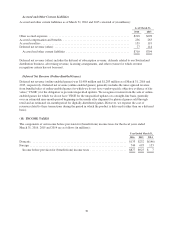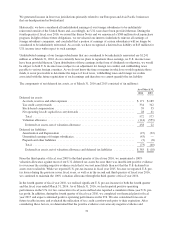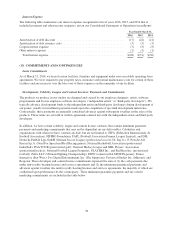Electronic Arts 2016 Annual Report Download - page 154
Download and view the complete annual report
Please find page 154 of the 2016 Electronic Arts annual report below. You can navigate through the pages in the report by either clicking on the pages listed below, or by using the keyword search tool below to find specific information within the annual report.
software developers are payments for the development of intellectual property related to our games. Co-
publishing and distribution royalties are payments made to third parties for the delivery of products.
Royalty-based obligations with content licensors and distribution affiliates are either paid in advance and
capitalized as prepaid royalties or are accrued as incurred and subsequently paid. These royalty-based obligations
are generally expensed to cost of revenue at the greater of the contractual rate or an effective royalty rate based
on the total projected net revenue for contracts with guaranteed minimums. Prepayments made to thinly
capitalized independent software developers and co-publishing affiliates are generally made in connection with
the development of a particular product, and therefore, we are generally subject to development risk prior to the
release of the product. Accordingly, payments that are due prior to completion of a product are generally
expensed to research and development over the development period as the services are incurred. Payments due
after completion of the product (primarily royalty-based in nature) are generally expensed as cost of revenue.
Our contracts with some licensors include minimum guaranteed royalty payments, which are initially recorded as
an asset and as a liability at the contractual amount when no performance remains with the licensor. When
performance remains with the licensor, we record guarantee payments as an asset when actually paid and as a
liability when incurred, rather than recording the asset and liability upon execution of the contract. Prepaid
royalties are classified as current assets to the extent that such amounts will be recognized in our Consolidated
Statements of Operations within the next 12 months. Royalty liabilities are classified as current liabilities to the
extent such royalty payments are contractually due within the next 12 months.
Each quarter, we also evaluate the expected future realization of our royalty-based assets, as well as any
unrecognized minimum commitments not yet paid to determine amounts we deem unlikely to be realized through
product and service sales. Any impairments or losses determined before the launch of a product are generally
charged to research and development expense. Impairments or losses determined post-launch are charged to cost
of revenue. We evaluate long-lived royalty-based assets for impairment using undiscounted cash flows when
impairment indicators exist. If impairment exists, then the assets are written down to fair value. Unrecognized
minimum royalty-based commitments are accounted for as executory contracts, and therefore, any losses on
these commitments are recognized when the underlying intellectual property is abandoned (i.e., cease use) or the
contractual rights to use the intellectual property are terminated.
During fiscal year 2016, we did not recognize any losses or impairment charges on royalty-based commitments.
During the fiscal year 2015, we recognized a loss of $122 million on a previously unrecognized licensed
intellectual property commitment. The $122 million loss related to the termination of certain rights we previously
had to use a licensor’s intellectual property. In addition, because the loss will be paid in installments through
March 2022, our accrued loss was computed using the effective interest method. We currently estimate
recognizing in future periods through March 2022, approximately $22 million for the accretion of interest
expense related to this obligation. This interest expense will be included in cost of revenue in our Consolidated
Statement of Operations.
The current and long-term portions of prepaid royalties and minimum guaranteed royalty-related assets, included
in other current assets and other assets, consisted of (in millions):
As of March 31,
2016 2015
Other current assets .......................................................... $ 54 $ 70
Other assets ................................................................ 63 59
Royalty-related assets ...................................................... $117 $129
68
























